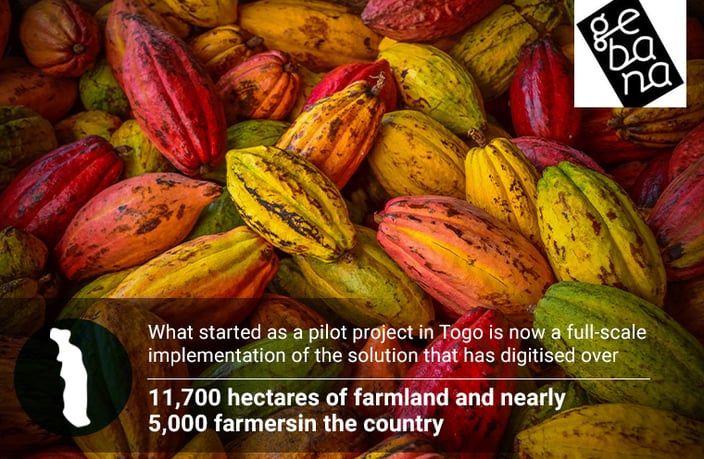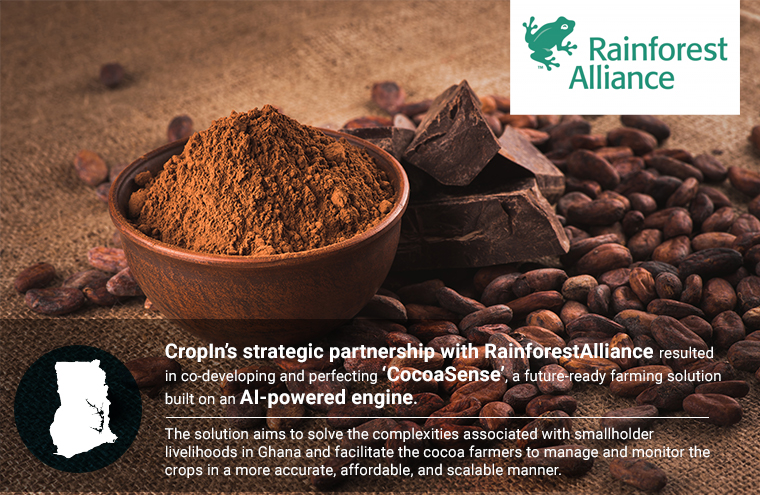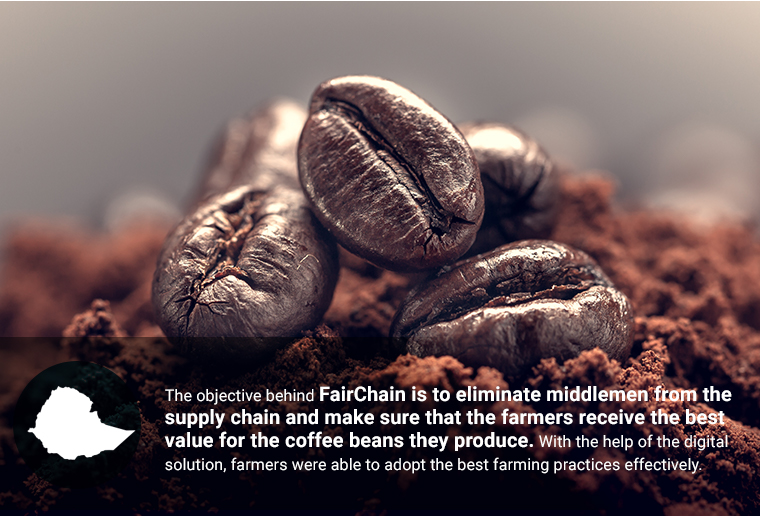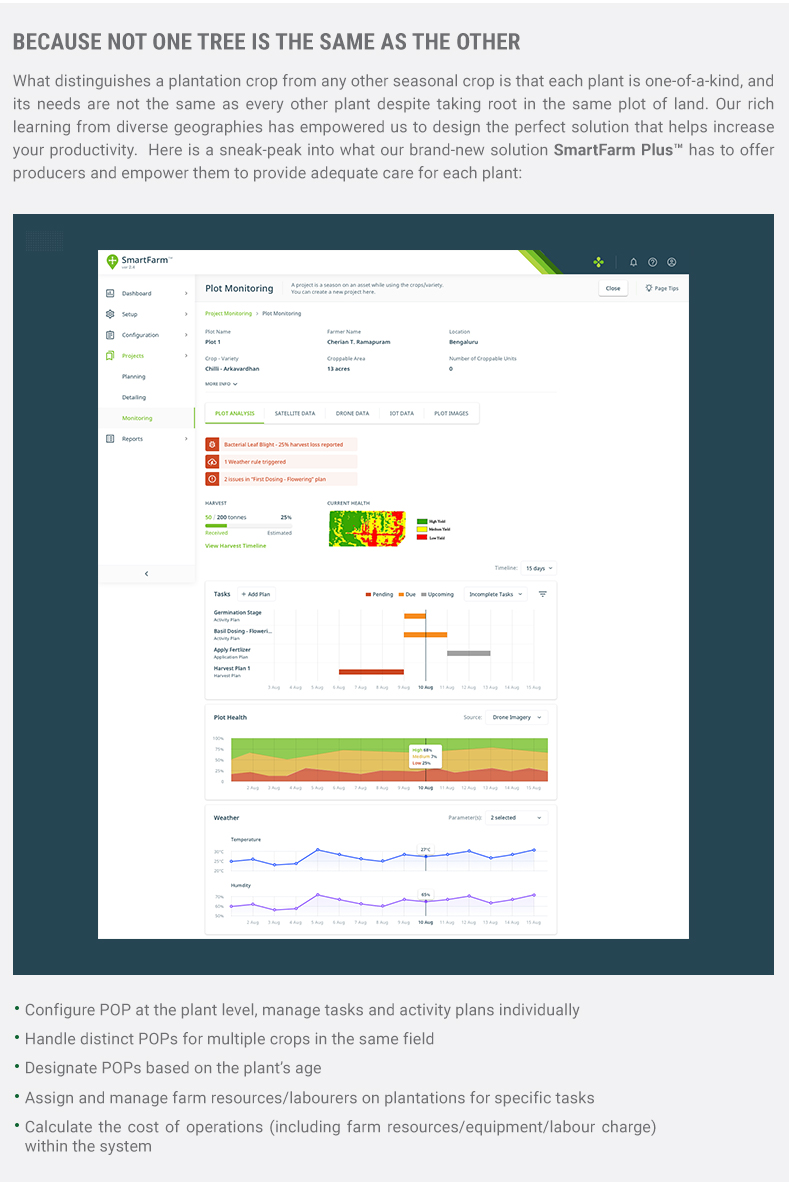In many developing countries, plantation agriculture serves as the vital cog in the socio-economic development of rural agrarian communities. The cultivation of a wide selection of these perennial crops, including tea, coffee, cocoa, cashew, coconut, rubber, oil palm, and areca nut, along with several spice crops, provide year-round employment opportunities, not only to farmers or the ‘pickers’ directly associated with the farms but also to those employed in horizontal and vertical linkages in the value chain. Their livelihoods are further strengthened by the continuing demand for these commodities due to the ever-increasing purchasing power of consumers, and the foreign exchange earnings these cash crops generate from export to premium markets.
Over the last few decades, transformation in the agricultural sector, owing chiefly to the adoption of scientific and technology-led practices, has resulted in an increase in productivity for producers of plantation crops. Notably, digital solutions have made it easier for agri-enterprises to manage and monitor crops more efficiently.
Agribusinesses around the world have leveraged Cropin Grow to digitize on-field processes for crops such as banana, coffee, cocoa, palm, and rubber, among others. The farm management solution has improved visibility over farm activities for the managers and has enabled the organizations to provide the farmers with better inputs and information for quality yield.
How Has Cropin Added Value For The Different Crop Value Chains?
Crop: Cocoa and Soy; Country: Togo
One of the finest examples of a successful implementation of Cropin Grow is that of Gebana, a company that sources certified organic produce from family farmers and delivers them to consumers in Europe. What started as a pilot project in Togo is now a full-scale implementation of the solution that has digitized over 11,700 hectares of farmland and nearly 5,000 farmers in the country.
According to Michael Stamm, a member of Gebana’s development team, one of the challenges they were to overcome is the ability to record data in the mobile application from the farms, despite unreliable internet connectivity, particularly in rural areas. Cropin’s offline functionality facilitates users to continue capturing data and uploading it to the cloud when the user has access to a good internet connection.
Digitizing the farm processes using Cropin Grow has empowered the agribusiness to enhance sustainability, improve transparency, and boost profitability. Quite recently, Gebana has also expanded the digitization drive to its operations in Burkina Faso, to also impact 3100+ farmers cultivating mango and cashew nut.
Learn more about the impact of Cropin’s solution in the case study HERE.

Crop: Banana; Country: India
Likewise, Cropin Grow was the preferred choice of a digital platform for FarmFolks Agro Pvt Ltd, a fresh produce agribusiness in Karnataka, India. The platform facilitated the enterprise to stipulate the package of practices for their banana plantations in Mysore and guide the farmers in aligning with the same. The timely advisories that the farmers received throughout the crop cycle helped the farmers optimize the application of agrochemicals, in terms of the products they use and its quantity, and reduce their cultivation cost significantly. Cropin’s end-to-end traceability feature also provided FarmFolks with the opportunity to secure Global G.A.P. certification for the produce, for both domestic and international markets.
Crop: Cocoa; Country: Ghana
Cropin’s strategic partnership with Rainforest Alliance resulted in co-developing and perfecting ‘CocoaSense’, a future-ready farming solution built on an AI-powered engine. The solution aims to solve the complexities associated with smallholder livelihoods in Ghana and facilitate the cocoa farmers to manage and monitor the crops in a more accurate, affordable, and scalable manner.
CocoaSense’s integrated offering starts with structured data aggregation and results in predictive and prescriptive intelligence delivered to individual growers (in the form of agronomy advisory), and also to the various actors invested in setting the farmers up for success. This collaboration offers Cropin the remarkable opportunity to impact every bite of chocolate and other products made of cocoa sourced from farms in Ghana and nearby regions.
Cropin also intends to support the underlying objective of SAT4Farming, a consortium that RainForest Alliance is a part of, to triple the average yields of Ghanaian cocoa farmers’ to 1,500 kg per year through innovations in farming.
Explore how Cropin adds value to the cocoa value chain HERE.

Crop: Coffee; Country: Ethiopia
Yet another interesting use case for Cropin’s traceability feature can be exemplified with the partnership with a Netherlands-based specialty coffee company. Said to be the first “FairChain” coffee, the company ensures a fairer coffee supply chain and better livelihoods for coffee growers in Ethiopia by both sourcing and roasting the coffee beans within the country.
The objective behind FairChain is to eliminate middlemen from the supply chain and make sure that the farmers receive the best value for the coffee beans they produce. With the help of the digital solution, farmers were able to adopt the best farming practices effectively. The company was also able to provide adequate support for women farmers and bring about bean-to-cup traceability for an increased premium for the smallholder farmers.


To get exclusive insights on Cropin Grow and to discover what more Cropin has to offer for plantation agriculture, talk to our Solutions Expert today!






